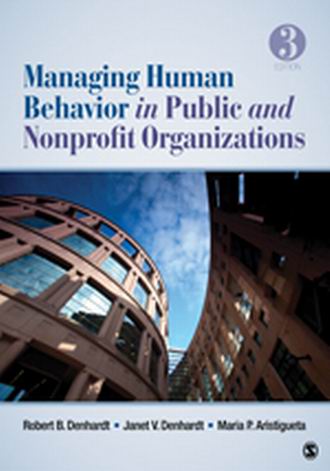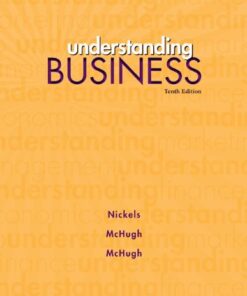Test Bank for Managing Human Behavior in Public and Nonprofit Organizations, 3rd Edition, Robert B. Denhardt, Janet V. Denhardt Maria P. Aristigueta
$55.00
Test Bank for Managing Human Behavior in Public and Nonprofit Organizations, 3rd Edition, Robert B. Denhardt, Janet V. Denhardt, Maria P. Aristigueta,
You will receive this product within 24 hours after placing the order
Test Bank for Managing Human Behavior in Public and Nonprofit Organizations, 3rd Edition, Robert B. Denhardt, Janet V. Denhardt, Maria P. Aristigueta,
You are buying Test Bank. A Test Bank is collection of test questions tailored to the contents of an individual . Test bank may contain: multiple choice, true/false, fill in the blank, matching, essay/short answer, and free-response questions. Please download sample for your confidential. All orders are safe, secure and confidential.
Preface
1. Organizational Behavior as a Way of Thinking and Acting
The Roots of Organizational Behavior
Values and Assumptions of Organizational Behavior
Themes and Purposes of This
2. Knowing and Managing Yourself
Where Do We Begin?
Life Experiences
Your Lifeline
Knowing Yourself Exercise
Ways of Thinking
Improving Your Sense of Self
Ways of Acting
Thinking in Action
Increasing Self-Knowledge
A Vision Statement
Valuing Diversity
Privatizing the Cafeteria
Laura’s Employment Dilemma
Some Career Advice
Appendix 2A: Reddin’s Personal Values Inventory
Appendix 2B: Fundamental Interpersonal Relations Orientation (FIRO) Behavior
Appendix 2C: Locus of Control
Appendix 2D: Career Orientation Inventory
Appendix 2E: Emotional Intelligence
3. Fostering Creativity
Where Do We Begin?
Ways of Thinking
Characteristics of Creative Individuals
Conceptual Skills and Abilities
Creativity as a Behavior
Creativity as a Process
An Integrated Perspective on Creativity
Why Do We Need Creativity in Public Organizations?
The Creative Process
Roles in the Creative Process
Social and Structural Connections
Impediments to Creativity
Other Ways of Thwarting Creativity
Fostering Creativity in Organizations
Techniques for Improving Creativity
Enhancing Your Personal Creativity
Ways of Acting
Thinking in Action
Mindmapping Exercise
Using Analogies
A Creativity Challenge
Adapting Innovations
Involving the Community
4. Managing Stress
Where Do We Begin?
Symptoms of Stress
Sources of Stress
Coping with Stress
Ways of Thinking
The Consequences and Costs of Stress
Stress: Good, Bad, and Ugly
Sources of Stress on the Job
Coping with and Managing Stress
Ways of Acting
Thinking in Action
Building Resilience
Distress at DES
Life Balance Exercise
Having Fun at Work
Developing Your Own Stress Management Program
Finding Happiness
5. Decision Making
Where Do We Begin?
Generating Alternatives
The Horse Grooming Case
Package Delivery
Ways of Thinking
Models of Decision Making
Who Should Be Involved?
What Techniques Are Available to Assist You?
Ways of Acting
Thinking in Action
A Decision-Making Framework
New Charter School
Using the Decision Tree for Levels of Participation
Using Performance Information for Decision Making
A Decision Diagnostic
6. Motivating Yourself and Others
Where Do We Begin?
What Motivates You Now?
What Will Motivate You in the Future?
Ways of Thinking
What is Motivation?
Changing Perspectives on Motivation
Ways of Acting
Thinking in Action
SOS in DHS: A Problem of Motivation
Staying Motivated
Being an Energizer
The Power of Public Service
7. Leadership in Public Organizations
Where Do We Begin?
What Makes a Good Leader?
Your Experience as a Leader
What is Your Leadership Style?
Ways of Thinking
Traditional Approaches to Leadership
Contemporary Approaches to Leadership
Leadership and Emotions: The Art of Leadership
Leadership in Culturally Diverse Organizations
The Ethics of Leadership
Leadership in the Public Service
Ways of Acting
Thinking in Action
Developing a Leadership Autobiography
A Debate Topic
Transactional Versus Transformational Leadership
Assessing Your Leadership Style
Leadership When No One Is in Charge
The Ethics of Leadership
8. Power and Organizational Politics
Where Do We Begin?
Ways of Thinking
Early Voices
Changing Perspectives on Workers and Organizations
Questioning Power and Authority
Sources of Power
Recognizing Power and Organizational Politics
Balancing Power
Structural Aspects of Power
Is Power a Positive Force or a Destructive Force?
Managing Power and Organizational Politics
Gaining Positive Political Skills
Empowerment: More than Delegation
Power and the Public Services
Ways of Acting
Thinking in Action
Politics and MBO: A Case Study
Observing Organizational Politics
It’s Not What You Know, It’s Who You Know?
Annie’s Dilemma
Assessing Your Power Potential
9. Communicating Effectively With Others
Where Do We Begin?
Ways of Thinking
Improving Interpersonal Communication
Specialized Forms of Communication
Exploring Diversity and Intercultural Communication
Ways of Acting
Thinking in Action
An Exercise in Supportive Communication
Turmoil in the Community Development Department
One-Way Communication Versus Two-Way Communication
Trends in Electronic Communication
A Dispersed Workplace: A Case Study
10. Working in Groups and Teams
Where Do We Begin?
Assessing Team Performance
Getting to Know Your Team
Team Agreements
Ways of Thinking
Types of Teams
Implementing Teams
Team Effectiveness
Measuring Team Effectiveness
Individual Styles and Team Development
Building a Collaborative Team
Ways of Acting
Thinking in Action
A Team-Building Exercise
The Case of Guard Uniforms
Relocating a State Reformatory School
A Team Exercise on Gender and Pay
Emotional Intelligence in Teams
How Well Does Your Team Deal with Conflict?
11. Managing Conflict
Where Do We Begin?
How Do You Behave During Conflict?
How Do Relationships Affect Conflict?
What Type of Resistance Are You Encountering?
Ways of Thinking
Theories of Conflict
Sources of Conflict
Stages of Conflict
Strategies of Negotiation and Conflict Management
Conflict and the Public Sector
Ways of Acting
Thinking in Action
Asking Questions
Individual Needs
Budget Surplus Case Study
Parks and Recreation Case Study
Bayshore Child Development Center
Conflict in an Emergency Situation
When is Conflict Healthy?
12. Organizational Change
Where Do We Begin?
To Change or Not to Change?
Your Orientation Toward Change
Discussing Your Experiences With Change
Ways of Thinking
Approaches to Understanding Change
Approaches to Bringing About Change
The Management of Change
The Ethics of Managing Change
A Final Note on Personal Change
Ways of Acting
Thinking in Action
Reasoning Processes in Organizational Change
Leading Change in Local Government
An Approach to Leading Change
13. Representing the Organization “On the Outside”
Where Do We Begin?
Networks and Relationships
Working With the Media
Ways of Thinking
The Core Skills of External Relations
Developing Effective Relations With the Legislature
Utilizing Technology
Working With the Media
Making Effective Presentations
The New Skills of External Relations
Listening to Citizens, Clients, and “Customers”
Involving Citizens in the Work of Government
Collaborating With Others
Ways of Acting
Thinking in Action
Improving Relationships with the Legislature
Improving Service Quality
Exploring the World of Networks
Community Involvement in Changing Priorities
14. Managing Behavior in the Public Interest
The New Public Service
Conclusion
References
Index
About the Authors












Reviews
There are no reviews yet.